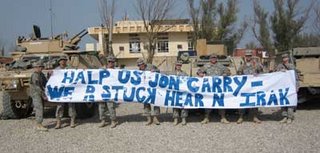|
Defending the virtues of liberty, free markets, and civilization... plus some commentary on the passing scene.
|
|
Freedom's Fidelity
Wednesday, January 24, 2007
Excuses, Excuses, ...and Man of the Year
Job change, wedding plans, holidays, pick an excuse. Actually I think it is more lack of motivation. I don't know how some of these guys blog quality stuff every single day and still hold a paying job and a social life. Ok, maybe they don't have a social life, but still....
For all of the above mentioned reasons I'll probably not blog for a while, but it's unlikely I'll ever shut this blog down completely... not like it costs much to keep it up, and I'm sure I will come back to it sooner or later, but probably later.
In the meantime, here is my early pick for man of the year. I ride the subway in Chicago everyday, and ever since this amazing story I try and do the calculations in my head, would I fit underneath the tracks? Would I even stick around to find out?!? Probably not.
This is a true hero, and it is surely not a coincidence that he is a former Navy man.
Tuesday, December 12, 2006
Belmont Club: Redress asymmetry
Yeah, I'm way behind, especially as the blogosphere measures time, but here is a great post from Wretchard last month that I'll quote at length:
Redressing the asymmetry of fear is one of key problems whose solution is required to win the War on Terror. It's often forgotten that the principle goal of a terrorist war is not simply to kill, but to do so in the most horrible possible way. It is the "terror" in terrorism that gives that mode of warfare its power. Fallujah provides a pointed contrast between an American approach that would release a man found with a bagful of washing machine timers because explosives are not present to prove he is an insurgent, with the ruthless campaign of murder and assassination waged against anyone who remotely cooperates with Americans. But the problem is not limited to Iraq. Withdrawing from Fallujah or Iraq won't mean an escape from the necessity to solve the problem of the asymmetry of fear. It only means changing the time and place when it must finally be faced.
Syria has recently rolled back much of the Cedar Revolution in Lebanon by killing its opponents in the most public possible way. With huge car bombs or entire clips of armor-piercing bullets fired through the window of a car. Across the world, Reuters reported that Philippine security forces seized improvised bombs hidden in thermos and lunch boxes in a hideout abandoned by Muslim militants on southwestern island of Jolo. One of the thermos jugs was stuffed with dynamite sticks, nitric acid and rigged with 4-inch nails while some lunch boxes were found with similar explosives and ball bearings. The bombs were electronically triggered and powered by two 9-volt batteries. As artifacts the lunch box bombs are the perfect embodiment of terrorism. They are constructed of ordinary, wholesome things. Batteries. Child's lunchboxes. And they are intended for the most horrible purposes; not simply to kill but to intentionally kill children. Not to kill them cleanly, but with the maximum of degradation: what better way to transform children than with acid and 4-inch nails. And one of the ironies of the age is that often the media culture which prides itself in sensitivity cannot help but gasp in admiration at the strength of a culture which so carelessly transgresses the boundaries of Good and Evil.
Russia, probably because of its long history of experience with the brutalities of Central Asia, is psychologically familiar with the atmospherics of terror. It's secret service poisons handsome Heads of State with dioxin to disfigure them before death; or dopes it critics with Thallium, not simply to kill them, but that condemn them first to living death. The asymmetry of fear is the message in Fallujah, Lebanon, Jolo and London. Our satchels are full of death and yours full of Miranda Warnings. We are Gory Death and you are dusty Procedure. And that is why we call it asymmetrical warfare.
It is at heart a struggle between good and evil; and must begin with an understanding of what is good. Many liberal commentators mistakenly argue that "catch and release", and strict adherence to the letter of the Geneva Convention and international rules of evidence are necessary to attain the Moral High Ground; and thereby overawe the world with an admiration for America's shining moral superiority. But no one is impressed, not our friends nor our enemies. Because those pretensions to superiority based on legalisms are undermined at every turn by actual betrayals. The liberals have identified the wrong moral high ground, because a more convincing demonstration of moral superiority lies not in ostentatious adherence to often incomprehensible Western ceremonies but a sincere commitment to stand with and protect anyone who stands for good against evil.. In the Third World especially, America's moral quality will be judged more by its willingness to keep its word of honor than in any self-absorbed liturgy to the gods of political correctness. Moral superiority must first of all begin with a determination not to sacrifice men who have decided to fight on the American side; because without the ability to stand by those who have risked their lives for us, no sweet words, no fastidiousness references to law will adequately substitute. Against fear we must set not Moral Superiority, but love. Fear is the lunchbox bomb; yet our love is that we should lay our lives for our friends until the lunchbox bomb is no more. Down that road of love the road to winning over terrorism lies; down that path and not the path of Judas.
Some pretty powerful stuff there. Some of his commenters took issue with his assertion that love is the road to defeating ideologies of murder, but I think it is quite clear that Wretchard is not referring to the love that hippies like to cite as a means of achieving peace, but rather the willingness, in word and deed, to hitch our cart to those who stand and will fight for freedom with more than mere rhetoric.
Thursday, November 30, 2006
A Laugher
This just makes me laugh.
"Terrorist acts are the most shameful acts you can do," Ahmadinejad said. "This is not a help to the Iraqi nation."
Foreign Minister Mottaki, in an hourlong interview in his office after the briefing, elaborated on how Iran and Iraq "found common ground" this week.
Iran is intent on supporting the president, prime minister and government of Iraq, he said. Asked what security measure Iran could provide, he said, "Anything that is asked of us. They have to ask and they have to announce it."
So,after 3 years of funding terrorist activity in Iraq and violently opposing its democracy, Iran is now going to help out?
Riiiight.
In other words, they are going to do their damndest to take over Iraq and expand their theocracy.
Tuesday, November 28, 2006
Hitchens on Realism
Chris Hitchens is kicking James Baker down the stairs over our seemingly inevitable return towards realpolitik. (emphasis mine)
This will present few difficulties to Baker, who supported the Syrian near-annexation of Lebanon. In order to recruit the Baathist regime of Hafez Assad to his coalition of the cynical against Saddam in the Kuwait war, Baker and Bush senior both acquiesced in the obliteration of Lebanese sovereignty. "I believe in talking to your enemies," said Baker last month—invoking what is certainly a principle of diplomacy. In this instance, however, it will surely seem to him to be more like talking to old friends—who just happen to be supplying the sinews of war to those who kill American soldiers and Iraqi civilians. Is it likely that they will stop doing this once they become convinced that an American withdrawal is only a matter of time?
At around the same time he made this statement, Baker was quoted as saying, with great self-satisfaction, that nobody ever asks him any more about the decision to leave Saddam Hussein in power in 1991. It's interesting to know that he still feels himself invested in that grand bargain of realpolitik, which, contrary to what he may think, has not by any means been forgotten. It's also interesting in shedding light on the sort of conversations he has been having in Baghdad. For millions of Iraqis, the betrayal of their uprising against Saddam in 1991 is something that they can never forget. They tend to bring it up, too, and to fear a repetition of it. This apprehension about another sellout is especially strong among the Shiite and Kurdish elements who together make up a majority of the population, but it seems from its public reports so far that the ISG has not visited the Kurdish north of the country. If Baker thinks that the episode is a closed subject, it shows us something of what the quality of his "listening" must be like.
In 1991, for those who keep insisting on the importance of sending enough troops, there were half a million already-triumphant Allied soldiers on the scene. Iraq was stuffed with weapons of mass destruction, just waiting to be discovered by the inspectors of UNSCOM. The mass graves were fresh. The strength of sectarian militias was slight. The influence of Iran, still recovering from the devastating aggression of Saddam Hussein, was limited. Syria was—let's give Baker his due—"on side." The Iraqi Baathists were demoralized by the sheer speed and ignominy of their eviction from Kuwait and completely isolated even from their usual protectors in Moscow, Paris, and Beijing. There would never have been a better opportunity to "address the root cause" and to remove a dictator who was a permanent menace to his subjects, his neighbors, and the world beyond. Instead, he was shamefully confirmed in power and a miserable 12-year period of sanctions helped him to enrich himself and to create the immiserated, uneducated, unemployed underclass that is now one of the "root causes" of a new social breakdown in Iraq. It seems a bit much that the man principally responsible for all this should be so pleased with himself and that he should be hailed on all sides as the very model of the statesmanship we now need.
But he is being hailed as our foreign policy savior. Seems we are content to declare civil war and go home.
Wednesday, November 15, 2006
Thoughts on Rumsfeld and the Democratic Takeover
There are few things more jarring than driving through Middle-of-Nowhere, Connecticut, thinking that you should be coming up on your destination soon and seeing that you are:

Walking inside was equally breathtaking:

Thanks to a conference that my employer sent me to I spent most of last week there.
The downside was the timing. Because I've been away from a computer I've been subject to the free USA Today outside my hotel door and TV news shows to keep me informed on the happenings of Rumsfeld resigning and the Democrats taking over Congress. If anything it was a stark reminder of why I get nearly 100% of my non-local news from the internet. Seriously, CNN and the rest are painful to watch, they seem so unserious, so juvenile, so shallow.
As for the Democrats taking control of Congress, well, I'm agnostic at this point, so here are some pros and cons from 35,000 feet.
The Good:
1. All things being equal (or close enough) I generally like to see incumbents lose.
2. The Republicans get the message that they cannot take voters for granted, spend like drunken sailors and continue to count on Democrat ineptness to keep them in office.
3. We'll get to see how the Democrats govern, rather than how they ankle bite. For years they've been complaining about government spending, we'll get to see if that was principled criticism or just political posturing.
4. Split executive and legislative branches means government gridlock. That's a feature not a bug. The government not being able to get anything done means the government stays out of our lives. During wartime, I think you could make a compelling argument that this belongs on the bad side of the ledger, but for now I'll mark this as a positive, things are too gloomy otherwise.
The Bad:
1. Our first female speaker of the house and she doesn't even understand a high school level concept of eminent domain and the role of the Supreme Court.
2. Tax cuts may be repealed leading to larger deficits and a slower economy.
3. Rumsfeld's departure. I've always thought Rumsfeld to be a brilliant man of vision. Not many government officials have the ambition to attempt to remake an entrenched institution such as the military before it fails. Josh Manchester has a nice write up on Rumsfeld that I am in complete agreement with, while Victor Davis Hanson summarizes his record:
(1) Tried to take a top-heavy Pentagon and prepare it for the wars of the postmodern world, in which on a minute's notice thousands of American soldiers, with air and sea support, would have to be sent to some god-awful place to fight some savagery - and then be trashed live on CNN for doing it;
(2) less than a month after 9/11 he organized the retaliation against al Qaeda in the heart of primordial Afghanistan that removed the Taliban in seven weeks, when we were all warned that the U.S., like the British and Russians of old, would fail;
(3) oversaw the removal of Saddam in three weeks - after the 1991 Gulf War and the 12-years of 350,000 sorties in the no-fly-zones, and various bombing strikes, had failed.
(4) Ah, you say, then there is the disastrous three-year insurgency - too few troops, Iraqi army let go, underestimated "dead-enders" etc.? But Rumsfeld knew that in a counterinsurgency (cf. Vietnam 1965-71) massive deployments only ensure complacency, breed dependency, and create resentment, and that, in contrast, training indigenous forces, ensuring political autonomy, and providing air and commando support (e.g., Vietnam circa 1972-4) is the only answer - although that is a long process that can work only if political support at home allows the military to finish the job (cf. the turn-of-the-century Philippines, and the British in Malaysia).
He was a good man, and we were lucky to have him in our hour of need.
Indeed.
4. The possible return to cynical Cold War realpolitik in our foreign policy.
This, if it comes to be, is the one that could be really really bad. The cost of short term comfort today will likely mean disaster on a humanitarian and civilizational level in a decade or two. No, that's not hyperbole. Dean Esmay sarcastically comments on the 'Neocon Idiocy'
The Neocon idiocy was always to believe that Arabs and Muslims actually wanted things like democracy and self-determination and free speech and free press and political rights for their women.
Any realist could have told them that this was just a grand illusion, an imperialist imposition, and that the real Muslims and Arabs wanted nothing more than stability under the mighty hand of a strong but benevolent dictator. So long as that dictator was an Arab and a Muslim anyway.
I'm so very, very glad that George W. Bush has finally tuned in to this reality, and appointed foreign-policy "realists" like James Baker to take over the last 2 years of his Presidency. The world will be a much better place as a result.
The stupid idiot chimp George W. actually once believed that this was all a bad idea, and tried to make its repudiation the cornerstone of his Presidency. No wonder he'll be reviled by history. What American President could be so stupid as to believe such things?
Ahh yes, the so-called realpolitik that got us to where we were in 2001. The one where post-Gulf War I we encouraged the Shiites to rise up against Saddam and then passively watched as he slaughtered a hundred thousand or so. In my opinion that was one of the most shameful things our country has ever done, but at least it wasn't us that did the killing right!! At least we didn't have to hear about Hussein's next 15 years of torturous rule. And since it wasn't us, it wasn't on the front pages of our newspapers, so it was almost like it wasn't even really happening!! If only that were true.
In the past we've been demonized for supporting strongmen, for going the route of 'yeah, he's an a*shole, but he's our a*shole! And he balances out Iran after all!! And it keeps all the Arabs killing each other instead of us!!'
Fascinating how today, when we actually remove a few tyranical regimes and make the spread of democracy and freedom the cornerstone of our long term foreign policy, we're equally demonized.
Well, multi-lateral alliances with strongmen is hardly a moral position to take, and perhaps it was successful for a little while, but it eventually brought us mass murder in lower Manhattan. A return to realpolitik might be comforting now, but it will only kick the can down the road another decade or so. As long as the region is run by thuggish dictators then poverty, misery, and murder, will continue to fester and bread fanaticism in the Middle East until someone finally detonates a chemical, biological, or even nuclear weapon here in the United States. Care to ponder what our reaction might be when that happens? Since that is the road that realpolitik travels, you ought to.
It really is a race against time, we must reform a large part of the world sooner, or else we may have to cause mass civilian casualties later. It was done with the firebombing of Dresden, and it was done in Hiroshima and Nagasaki, and we flatteringly refer to those who did it as The Greatest Generation.
Don't think we're incapable of doing it again.
This post started with such a beautiful sunny photo, yet ended on such a contrastingly dark note. Such is the absurdity of life - capable of supplying so much joy and happiness, yet more than apt when it comes to inflicting tragedy.
Thursday, November 02, 2006
The Kerry Flap
I don't have many thoughts on the John Kerry gaffe other than the fact that I find it impossible to believe that he really planned on saying what he did. He's a career politician, he would have understood the repercussions of making such a comment. Kerry's instinct for political expedience suggests it really was a mispeak.
However, that doesn't mean it was a mis-thought. Given John Kerry's decorated history of disparaging US soldiers it is increasingly difficult to believe that, on some level, he doesn't truly look down his nose at them. As the Belmont Club asks, "what should prevent him from holding the view that it's so much better to be a lawyer, movie star or senator than it is to be a grunt talking to a sheik in mixed Arabic and sign-language somewhere back of the beyond?"
Almost certainly nothing.
Yet, the most subtley clever response comes not from any Republican or Democrat facing down the home stretch of these midterm elections, but rather from the same men and woman who were the object of Kerry's scorn, half a world away.

Thanks to the internet, word travels fast..... and it goes both ways.
Pic via InstaPundit, who has much more.
Tuesday, October 31, 2006
Misfit Pumpkins 2006
Our Halloween pumpkin carving weekend has turned into a nice little tradition out at our "second home." I somehow managed to not get any pictures of ourselves doing the work, but maybe that's cause I was too busy with beer and pumpkin guts.
Going in, we weren't quite sure how we would top last year's band of Misfit Pumpkins, so we doubled the pumpkins and upped the creativity. I think you'll agree that we did in fact outdo ourselves.
So, let me present the Misfit Pumpkins of 2006!
(click any images for a larger versions)

Here are some close-ups, this first one, cannibal pumpkin, is mine.




Here are the second group of 4 we did, Totem Pumpkins

At night, the bottom one looks like a ribcage and vital organs, eh?

I just love the fiery eye effect here:

And note how bright orange the inside of the bat pumpkin appears here:

Here they are, as dusk descends, the Misfit Pumpkins ready to go out and raise havoc!


I think we have our work cut out for us next year.
Happy Halloween!
|
|













